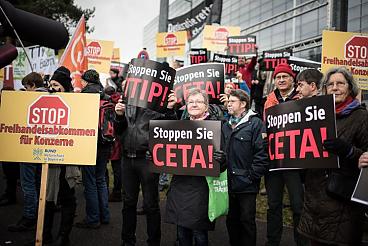Jasper van Dijk: CETA annex no more than a sop
Jasper van Dijk: CETA annex no more than a sop

While the TTIP negotiations have been postponed, the implementation of the Comprehensive Economic and Trade Agreement (CETA) with Canada has been fast-tracked, with the treaty’s signing having been fixed for 27 October. CETA comes down to TTIP via the back door, because most US corporations have subsidiaries in Canada. Major claims for damages can therefore be made just as easily against the Netherlands via CETA as via TTIP. That’s why we are demonstrating in Amsterdam on 22 October and why we are calling on trade minister Lilianne Ploumen not to approve the agreement.
 Thanks to CETA, multinationals will be able to tighten their grip on policy significantly. This isn’t surprising when you consider that during negotiations they have contributed extensively to the treaty’s content. Representatives of corporate business will soon be able to take their seats in an Advisory Council in which European and Canadian regulations will be harmonised. A special arbitration tribunal will give corporations the chance to sue a state for millions of euros should its government wish to introduce measures to protect its citizens. So CETA means more power for corporations, less power for people.
Thanks to CETA, multinationals will be able to tighten their grip on policy significantly. This isn’t surprising when you consider that during negotiations they have contributed extensively to the treaty’s content. Representatives of corporate business will soon be able to take their seats in an Advisory Council in which European and Canadian regulations will be harmonised. A special arbitration tribunal will give corporations the chance to sue a state for millions of euros should its government wish to introduce measures to protect its citizens. So CETA means more power for corporations, less power for people.
European norms will come under pressure as Canada and the EU, via CETA, attempt as far as possible to establish ‘mutual recognition’ of each other’s standards. In the case of farm products, for example, this could have extremely negative consequences for food safety. Canada, like the United States, allows the use of growth hormones, carcinogenic weedkillers and genetically manipulated products. CETA will make is harder to keep these products out of Europe.
Lastly, CETA puts in jeopardy the precautionary principle, which states that products cannot be marketed if it cannot be demonstrated that they pose no threat to public health. This principle distinguishes Europe from North America, where the usual situation is rather that you have to enforce your rights at law once the damage has been done.
CETA’s supporters, who include trade minister Ploumen, have now dreamed up a trick designed to respond to these criticisms. At the last minute a ‘Joint Interpretative Declaration’ has been appended to the text with the aim of clarifying the treaty’s doubtful passages. The declaration expresses all sorts of good intentions regarding the preservation of control of public services and respecting standards in the areas of “public health, social services, public education, safety, the environment, public morals, social or consumer protection and the promotion and protection of cultural
diversity. “ The status of this annex is, however, totally unclear. Canadian lawyer Steven Shrybman of Goldblatt Partners has stated that such declarations have no legal value, going so far as to insist that any tribunal referring to the text in its deliberations would be jeopardising its own credibility. The European Parliament research service has also noted that a declaration of this kind would only be legally binding were it fully integrated into the treaty. The chance that this will happen is small.
The joint declaration gives every impression of being a panicky measure in which a few soothing words have been tacked on to the treaty at the last minute. This hurried way of going about things is moreover completely at odds with Ploumen’s recent appeal for the negotiations to be ‘reset’. Treaties like the TTIP and the CETA should no longer be rigged up in backrooms, she stated. “Negotiations should be much more open, more transparent and more democratic.” We agree, but would like to know why in that case she is in such a hurry to agree to CETA.
Decision-making has become an enormous rush job, with approval in Brussels already planned for October 18th, and the signing of the treaty fixed for 27th. Parliamentarians from twenty-eight member states and Canada will therefore have no more than a week to judge the entire package. That has nothing to do with democratic decision-making; it amounts to shoving a treaty down MPs’ throats.
In short, this decision-making process is negligent and the joint declaration lacks any legal force. It’s a sop that changes nothing when it comes to CETA’s negative consequences. Minister Ploumen must renounce signing the agreement, therefore. Only then will justice be done to the concerns of critics.
- See also:
- World
